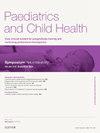益生菌在新生儿重症监护室:个人实践
Q3 Medicine
引用次数: 0
摘要
在新生儿重症监护病房的早产儿中使用益生菌来减少肠道生态失调,从而降低这些易感新生儿的发病率,这一点越来越受到关注。然而,在各种试验中使用的生物的异质性意味着仍然没有明确的证据来提出强有力的建议,益生菌的使用仍然多种多样。本文章由计算机程序翻译,如有差异,请以英文原文为准。
Probiotics in the NICU: a personal practice
There is increasing interest in the use of probiotics in preterm infants in NICUs to reduce intestinal dysbiosis and subsequently reduce morbidity in these vulnerable neonates. However, heterogenicity of organisms used in various trials has meant definitive evidence is still not available to make strong recommendations and probiotic use remains varied.
求助全文
通过发布文献求助,成功后即可免费获取论文全文。
去求助
来源期刊

Paediatrics and Child Health (United Kingdom)
Medicine-Pediatrics, Perinatology and Child Health
CiteScore
1.20
自引率
0.00%
发文量
70
 求助内容:
求助内容: 应助结果提醒方式:
应助结果提醒方式:


